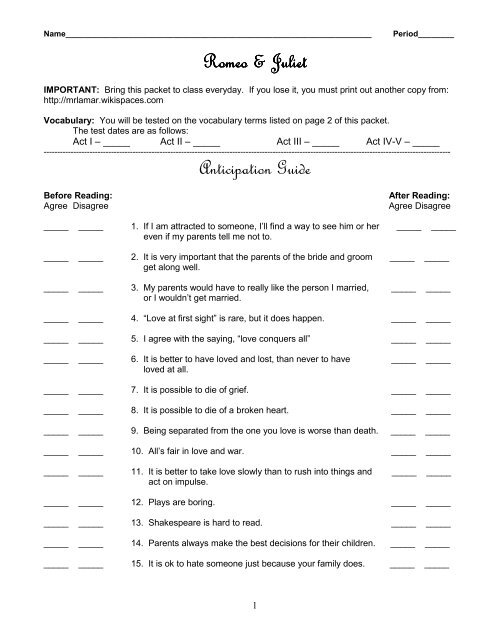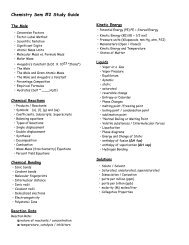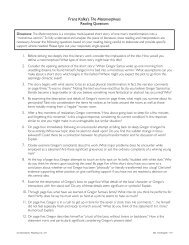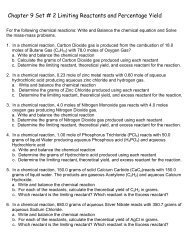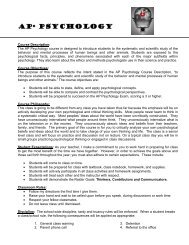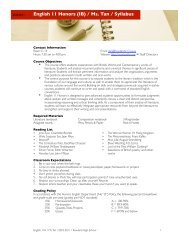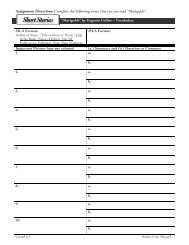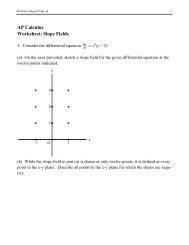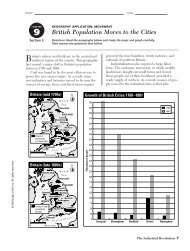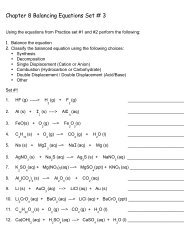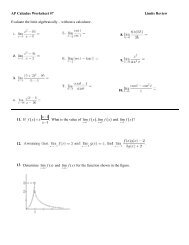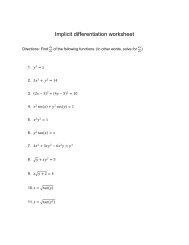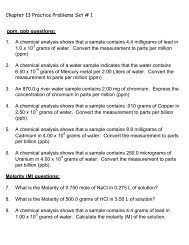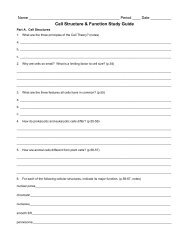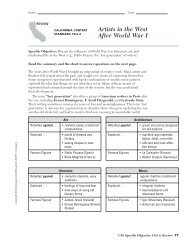R_J student guide - Rowland High School
R_J student guide - Rowland High School
R_J student guide - Rowland High School
You also want an ePaper? Increase the reach of your titles
YUMPU automatically turns print PDFs into web optimized ePapers that Google loves.
Name____________________________________________________________________Romeo & JulietPeriod________IMPORTANT: Bring this packet to class everyday. If you lose it, you must print out another copy from:http://mrlamar.wikispaces.comVocabulary: You will be tested on the vocabulary terms listed on page 2 of this packet.The test dates are as follows:Act I – _____ Act II – _____ Act III – _____ Act IV-V – _____-------------------------------------------------------------------------------------------------------------------------------------------------------Anticipation GuideBefore Reading:Agree DisagreeAfter Reading:Agree Disagree_____ _____ 1. If I am attracted to someone, I’ll find a way to see him or her _____ _____even if my parents tell me not to._____ _____ 2. It is very important that the parents of the bride and groom _____ _____get along well._____ _____ 3. My parents would have to really like the person I married, _____ _____or I wouldn’t get married._____ _____ 4. “Love at first sight” is rare, but it does happen. _____ __________ _____ 5. I agree with the saying, “love conquers all” _____ __________ _____ 6. It is better to have loved and lost, than never to have _____ _____loved at all._____ _____ 7. It is possible to die of grief. _____ __________ _____ 8. It is possible to die of a broken heart. _____ __________ _____ 9. Being separated from the one you love is worse than death. _____ __________ _____ 10. All’s fair in love and war. _____ __________ _____ 11. It is better to take love slowly than to rush into things and _____ _____act on impulse._____ _____ 12. Plays are boring. _____ __________ _____ 13. Shakespeare is hard to read. _____ __________ _____ 14. Parents always make the best decisions for their children. _____ __________ _____ 15. It is ok to hate someone just because your family does. _____ _____1
VocabularyAct I1. act- major unit of action in a play2. scene- each act is divided further intoscenes, which represent a different timeand/or place3. lines- spoken words of the play, “sentences”4. prologue- an introduction to a play or an actof a play5. oxymoron-figure of speech that combinestwo normally contradictory terms, ex: prettyugly6. pun- multiple meanings of words that createa joke7. civil- adhering to the norms of polite socialinteraction8. disposition- mental outlook; tendency ofone’s spirits9. endure- to hold against; sustain10. grievance- resentment or complaint11. intrusion- wrongful entry12. revel- to take delight; to make merry13. spite- desire to harm or annoy14. valiant- boldly courageous or brave15. virtuous-conforming to moral principalsAct II1. personification- figure of speech in whichhuman qualities are attributed to an abject,idea, or idea2. simile- figure of speech that compares twounlike things using like, as, than, orresembles3. metaphor- figure of speech that comparestwo unlike things WITHOUT using like, as,than, or resembles4. hyperbole- figure of speech in which thetruth is exaggerated for emphasis orhumorous effect5. reversed- reversing the normal order ofwords for effect, ex: up fill, rather than fill up6. alliance- relationship created between twoparties7. cherish- to hold and treat as dear8. chide- to scold or find fault9. envious- jealous with ill-will10. incorporate- combine in one body11. predominant- having power, authority, orinfluence12. rancor- bitter resentment or ill-will13. torment- to afflict with great bodily or mentalsuffering14. variable- likely to change; changeable15. wanton- without regard for what is right2Act III1. aside- dramatic device when a characterspeaks their thoughts aloud, and meant forthe audience to hear but the characters onstage do not hear2. soliloquy- a speech in which a characterspeaks their thoughts aloud, generally alonenot be conscious of addressing the audience3. absolve- to free from consequences4. affliction- state of pain5. ally- to unite formally6. dismal- gloomy; cheerless; captivated7. enamored- inflamed with love; captivated8. jest- joke or witty remark9. lamentation- expression of grief or sadness10. reconcile- to bring acceptance11. submission- humble obedience12. vengeance- infliction of trouble, injury, painwith forceAct IV1. irony- contrast between appearance andreality, reality usually opposite from what isseen2. imagery- descriptive words/phrases thatallow the reader to almost see, hear, smell,taste, and touch what is being described3. detestable- hateful; vile4. enjoined- to direct or order; to force to dosomething5. heir- a person who inherits property ofanother6. lamentable- regrettable; unfortunate7. pensive- serious. Full of thoughts8. prosperous- fortunate; successful9. receptacle- container; device that holdssomething10. redeem- to make up for11. stifle- to smother; to crush or end by force12. wayward- turn away from what is right;disobedientAct V1. sonnet- a poem make up of 14 lines and hasa specific rhyming pattern2. aloof- at a distance; disinterested3. ambiguity- doubt or disbelief4. apothecary- licensed to prescribe medicine5. enmity- feeling or condition of hostility6. felon- wicked person, someone convicted ofa felony7. infectious- tending to spread from one toanother8. kindred- family; relationship by birth9. menace- threatens to cause evil10. scourge- to punish or criticize11. tedious- long and tiresome
Act 1 scene1: Yin-YangThe Yin-Yang is an ancient Chinese symbol that represents the duality of nature and attempt to explain howeverything works. The outer circle represents “everything”, while the black and white shapes within the circlerepresent the interaction of two energies, called “yin” (black) and “yang” (white), which causes everything tohappen. They are not completely black and white, they cannot exist without each other. The shape of the yin andyang sections of the symbol, actually gives you a sense of the continual movement of the two energies, yin toyang and yang to yin, causing everything to happen. Therefore, the yin-yang represents all opposites.Your assignment: represent Romeo’s state oxymoronic state in Act I, scene I by creating your own yinyangsymbol.Directions:1. Chose one oxymoron from the following lines:Here’s much to do with hate, but more with love.Why, then, O brawling love! O loving hate!O any thing of nothing first create!O heavy lightness! Serious vanity!Mis-shapen chaos of well-seeming forms!Feather of lead, bright smoke, cold fire,Sick health!Still-waking sleep, that is not what it is!This love feel I, that feels no love in this.2. Find pictures online, in newspapers, and magazines to represent each aspect of your chosen oxymoron.3. Create a Yin-Yang on paper and glue the pictures on the respected side.-----------------------------------------------------------------------------------------------------------------------------------------Act 1, Scene 5: Capulet’s FeastYou have been invited to Capulet’s feast tomorrow! Select one of the two following options for yourassignment:1. You must receive an invitation to go to this fancy party. Create an invitation with all the information about theparty on it: When, where, who can attend, what to wear, what food will be served, etc. Remember the invitationneeds to also reflect the theme and family stature of the Capulets. Creative invitations will receive more points.2. A mask is part of your dress code, so you will need to make one. Does it need to be artistic? No. Does itneed to be complicated? No. Does it have to be pretty? Only if you want to be. Use any materials that you mayhave at home: cardboard, felt, fabric scraps, construction paper, aluminum foil, tissue paper, crayons, markers,glitter, feathers, magazine pictures, ribbon, paint, etc------------------------------------------------------------------------------------------------------------------------------------------------------Act 2 Scene 1: NewspaperDirections: In groups (no more than 5 people), create a newspaper announcing the events in Verona during thetime of the play.1. Give the newspaper a name.2. Each person must write 2 “articles” for the paper. One must contain at least 100 words, and the other canbe a shorter one or even an advertisement. For example, someone should write about the Capulet’sparty, but other options can be about fashion, celebrities from Shakespearean times, advise columns,political news, headline news, other events in the city/country.-------------------------------------------------------------------------------------------------------------------------------------------------------Act 3, scene 1:Lazy SonnetDirections: After reading, write a lazy sonnet describing a scene from the act. Draw a picture to accompany it.Regular sonnets contain 14 rhyming lines, but a lazy sonnet contains 14 words (one per line) that describe theevent.-------------------------------------------------------------------------------------------------------------------------------------------------------3
Act 3, scene 2: Night ImageryDirections: Read Juliet’s speech in Act 3 scene 2 lines 1-33.1. Write down each time the word “night” is used (including the entire image)2. What feelings/images are associated with each use of “night”—you can describe the images or drawthem.3. How does the imagery of night add to this scene?4. How is the image of night in this play different from how night is traditionally symbolized in literature?5. Draw a picture of one of the images from the passage.-------------------------------------------------------------------------------------------------------------------------------------------------------Act 4, scene 1: I’d rather… PoemASSIGNMENT: Write a poem in the style of Shakespeare’s poem “I’d rather” speech by Juliet. You need toinclude the thing you don’t want to do in the beginning and end, and have ten or more alternatives listed in themiddle of the poem. The point of the poem is to create outrageous alternatives to show exaggeration, so do notcreate alternatives that you actually would want to do. A <strong>student</strong> example is provided.JULIET O, bid me leap, rather than marry Paris,80 From off the battlements of yonder tower;Or walk in thievish ways; or bid me lurkWhere serpents are; chain me with roaring bears;Or shut me nightly in a charnel house,O'ercovered quite with dead men's rattling bones,85 With reeky shanks and yellow chapless skulls;Or bid me go into a new-made graveAnd hide me with a dead man in his shroud—Things that, to hear them told, have made me tremble—And I will do it without fear or doubt,90 To live an unstained wife to my sweet love.Oh have me share my bed, rather than eat mayonnaise,With one million slimy grand-daddy long legs,Or take away my phone; or leave me aloneIn the dark; forbid me to eat chocolate;Or make me stay a rainy day at Disneyland;To have no social life in school,Isolated from all my friends;Or bid me listen to classical music, or raid my closetAnd dress me like a preppyThese that to hear them would make me trembleI would do without fear or doubtTo never have to eat, or look, orSmell mayonnaise again----------------------------------------------------------------------------------------------------------------------------------------------------Act 4, scene 3: Advise ColumnDirections: Romeo and Juliet did not, of course, have a great advantage in their day that we have in ours: to beable to write to a local or national advise columnist to answer “unsolvable” problems. But imagine they did.Step 1: Write a letter from either Romeo’s or Juliet’s perspective about any event in the play so far asking adviseabout what to do. The letter must be in letter format.Step 2: After you turn in your questions in class, you will be given a letter and must answer it with the advise youwould give as if you were the advise columnist.------------------------------------------------------------------------------------------------------------------------------------------------------Act 5: Fate versus Human ErrorWhat is fate? ______________________________________________________________________________Answer each question with: F for fate or H for human error.1. Romeo receives news that Juliet is dead _____ 2. Romeo buys poison _____3. The Friar’s message does not reach Romeo _____ 4. Paris and Romeo meet at Juliet’s tomb. _____5. Romeo kills Paris _____ 6. Romeo swallows the poison ______7. Juliet stabs herself with Romeo’s dagger _____ 8. Friar Lawrence arrives at Juliet’s tomb too late _____9. Capulet and Montague end the feud _____4
Significant QuotesDirections: For all of the following quotes, identify (1) who said it, (2) who heard it, (3) what/who is thequote about, (4) what do the lines mean either literally or figuratively, (5) are there any literary devicesin the quote, and (6) why is this quote important to the story or character development?Act I1. “Many a morning hath he there been seen/ With tears augmenting the morning’s dew” (I.i. 129-130)2. ”I have a soul of lead/ So stakes me to the ground I cannot move” (I.iv. 15-16)3. “My only love sprung from my only hate!” (I.v. 138)Act II1. “What’s in a name? That which we call a rose/By any other word would smell as sweet”(III.ii. 43-44)2. “Young men’s love then lies/Not truly in their hearts, but in their eyes.” (II.iii. 67-68)3. “In one respect I’ll thy assistant be;/ For this alliance may so happy prove/ To turn yourhouseholds rancor to pure love.” (II.iii. 90-92)Act III1. “Ask for me/tomorrow, and you shall find me a grave man” (III.i. 94-95)2. “Mercy by murders, pardoning those that kill” (III.i. 195)3. “O serpent heart, hid a flow’ring face!/Did dragon keep so fair a cave?Was ever bookcontaining such vile matter/ So fairly bound?” (III.ii 73-74, 83-84)4. “These times of woe afford no times to woo” (III.iv.8)5. “Indeed I shall never be satisfied/ With Romeo till I behold him—dead--/ is my poor heart so fora kinsman vexed” (III.v. 93-95)6. “And you be not, hang, beg, starve, die in the streets, / For, by my soul, I’ll ne’er acknowledgethee” (III.v. 192-193)Act IV1. “Now, sir, her father counts it dangerous/ That she do give her sorrow so much away, / And inhis wisdom haste our marriage” (IV.i. 9-11)2. “O, shut the door, and when thou has done so,/ Come weep with me—past hope, past care,past help!” (IV.i. 44-45)3. “Death lies on her like an untimely frost/ Upon the sweetest flower of all the field” (IV.v. 28-29)Act V1. “Well, Juliet, I will lie with thee tonight” (V.i. 34)2. “Alas, my liege, my wife is dead tonight!/ Grief of my son’s exile hath stopped her breath.”(V.iii. 210-211)3. “And I, for winking at your discords too, /Have lost a brace of kinsmen. All are punished”(V.iii. 294-295)5
CharacterizationIdentify the characters:RomeoJulietLord CapuletLady CapuletLord MontagueLady MontagueNurseBenvolioMercutioFriar LaurenceTybaltPrince EscalusParisFriar JohnBalthasarSampsonGregoryAbramThe ApothecaryPeterRosalineThe Chorus6
DayEventsTimelineSundayMondayTuesdayWednesdayThursday7


